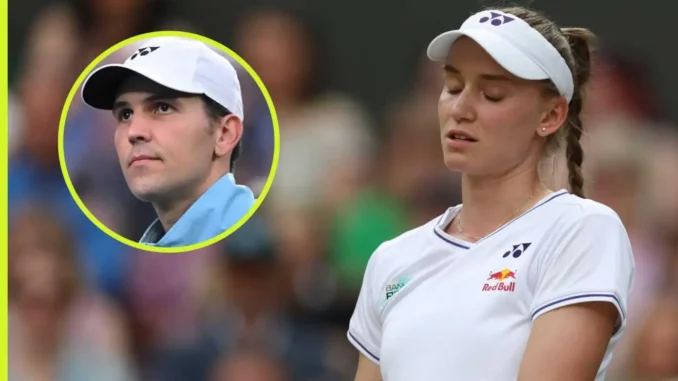
Elena Rybakina’s recent reunion with her former coach Stefano Vukov has sent shockwaves through the tennis world, reigniting debates about their controversial working relationship. The decision to rekindle their professional partnership has left fans and analysts puzzled, with many questioning the rationale behind Rybakina’s move. While the Kazakh tennis star has enjoyed a meteoric rise under Vukov’s guidance, the duo’s history is marred by public disagreements and allegations of an unhealthy dynamic. This unexpected reunion has, therefore, raised significant concerns and fueled speculation about its potential implications for Rybakina’s career.
Rybakina, the 2022 Wimbledon champion, initially parted ways with Vukov earlier in 2024 after a string of public controversies surrounding their relationship. The split was widely seen as a necessary step for the 24-year-old to focus on her mental well-being and professional growth. During their time together, Vukov was instrumental in helping Rybakina harness her immense talent and establish herself as a force on the WTA Tour. However, their partnership was also characterized by moments of tension, including visible disagreements during matches and public criticisms of Vukov’s coaching style.
One of the most contentious aspects of their relationship was the perception that Vukov’s approach often crossed boundaries, leading to questions about the impact on Rybakina’s mental health. Critics accused Vukov of being overly critical and demanding, with some incidents captured on camera during high-stakes matches. These moments led to widespread discussions about the importance of player-coach dynamics in professional tennis, highlighting the need for supportive relationships that prioritize the athlete’s well-being.
When Rybakina announced her decision to end her collaboration with Vukov, it was met with widespread support from fans and fellow players. Many believed that the split would allow her to focus on building a more positive and empowering environment around her. In the months following their separation, Rybakina continued to perform at a high level, demonstrating resilience and determination as she navigated the challenges of the tour. Her ability to remain competitive despite the change in her coaching setup was seen as a testament to her mental strength and adaptability.
Given this context, the announcement of their reunion has left many scratching their heads. What prompted Rybakina to revisit a partnership that she previously deemed unworkable? Has Vukov’s coaching philosophy changed, or has Rybakina reassessed her own perspective on their dynamic? These questions remain unanswered, adding an air of mystery to the decision.
For some, the reunion signals a pragmatic choice by Rybakina, who may believe that Vukov’s technical expertise outweighs the challenges of their past relationship. There is no denying that Vukov played a pivotal role in elevating her game, particularly in developing her powerful serve and aggressive baseline play. His tactical insights and ability to prepare her for the physical and mental demands of the tour were instrumental in her Grand Slam success and her ascent to the upper echelons of the WTA rankings.
However, the question remains whether these professional benefits can coexist with a healthy and supportive working relationship. Critics argue that returning to a coach with whom she had such a turbulent history could undermine Rybakina’s confidence and emotional stability. The pressure of competing at the highest level is already immense, and any additional strain from an unhealthy dynamic could hinder her performance and long-term development.
The decision also raises broader questions about the role of player-coach relationships in professional tennis. In a sport where athletes are often isolated and under constant scrutiny, the influence of a coach extends far beyond technical instruction. A supportive coach can serve as a mentor, confidant, and motivator, helping players navigate the highs and lows of their careers. Conversely, a strained relationship can exacerbate stress and create an environment that is detrimental to the player’s well-being.
Rybakina’s choice to reunite with Vukov may also reflect the limited options available to elite players seeking top-tier coaching. The pool of experienced and successful coaches on the WTA Tour is relatively small, and finding someone who understands her game and aligns with her ambitions may have been a challenging task. It’s possible that Rybakina weighed the pros and cons and concluded that rekindling her partnership with Vukov was the best path forward, despite the risks.
As the tennis community grapples with the implications of this reunion, all eyes will be on Rybakina to see how the decision impacts her performance. Will the renewed partnership unlock another level of her potential, or will it reignite the issues that plagued their relationship in the past? The early signs from their collaboration in the upcoming tournaments will likely provide some clues about the trajectory of this new chapter.
Ultimately, Rybakina’s decision to work with Vukov again highlights the complexity of player-coach relationships in professional tennis. While results on the court will ultimately determine the success of their reunion, the underlying questions about the dynamics of their partnership will continue to generate discussion. For now, Rybakina’s fans can only hope that this bold move will bring out the best in her, allowing her to build on her achievements and cement her status as one of the sport’s brightest stars.
Leave a Reply